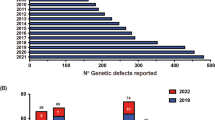Abstract
Population genetic studies of the major histocompatibility complex (MHC) class III region, comprising C2, BF and C4 phenotypes, and molecular genetic data are rarely available for populations other than Caucasoids. We have investigated three Amerindian populations from Southern Brazil: 131 Kaingang from Ivaí (KIV), 111 Kaingang (KRC) and 100 Guarani (GRC) from Rio das Cobras. Extended MHC haplotypes were derived after standard C2, BF, C4 phenotyping and restriction fragment length polymorphism (RFLP) analysis with TaqI, together with HLA data published previously by segregation analysis. C2 and BF frequencies corresponded to other Amerindian populations. C4B*Q0 frequency was high in the GRC (0.429) but low in the Kaingang. Unusual C4 alleles were found, viz. C4A*58, A*55 and C4B*22 (presumably non-Amerindian) and aberrant C4A*3 of Amerindian origin occurring with a frequency of 0.223 in the GRC. C4A*3 bands of homo- and heterozygous individuals carrying this variant were Rodgers 1 positive and Chido 1,3 positive, showed a C4A specific lysis type and a C4A like α-chain. Polymerase chain reaction studies and sequencing showed that this is based on a C4A*3 duplication with a regular C4A*3 and a partially converted C4A*0304 carrying the C4B specific epitopes Ch 6 and Ch 1,3. Associations of class III haplotypes with particular RFLP patterns were similar to those reported for Caucasoids. The previously described association between combined C4A and CYP21P deletions and the 6.4 kb TaqI fragment was not seen in these Amerindians. This fragment occurred within a regular two locus gene structure in the Kaingang, representing a “short” gene at C4 locus I. C4 and CYP21 duplications were frequently observed. The distribution of extended MHC haplotypes provides evidence for a close relationship between the KIV and KRC and a larger genetic distance between the two Kaingang groups and the GRC.
Similar content being viewed by others
Author information
Authors and Affiliations
Additional information
Received: 6 March 1997 / Accepted: 13 May 1997
Rights and permissions
About this article
Cite this article
Weg-Remers, S., Brenden, M., Schwarz, E. et al. Major histocompatibility complex (MHC) class III genetics in two Amerindian tribes from Southern Brazil: the Kaingang and the Guarani. Hum Genet 100, 548–556 (1997). https://doi.org/10.1007/s004390050550
Issue Date:
DOI: https://doi.org/10.1007/s004390050550




